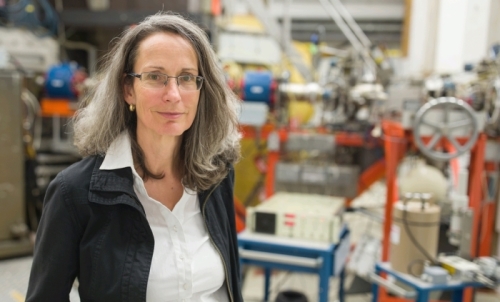Andrea Denker is Professor of "Accelerator Physics for Medicine"

Prof. Dr. Andrea Denker is the head of the department "Proton Therapy" at HZB. © HZB/ M. Setzpfandt
The Beuth Hochschule für Technik Berlin and the Helmholtz-Zentrum Berlin (HZB) have appointed Prof. Dr. Andrea Denker to the joint professorship "Accelerator Physics for Medicine" as of October 1, 2018. Since 2006, Andrea Denker is head of the department "Proton Therapy" at the HZB, which operates the accelerator for eye tumor therapy. The therapy, offered in cooperation with the Charité - Universitätsmedizin Berlin and the HZB, is unique in Germany.
As part of her professorship, Andrea Denker is taking on lectures in the "Physical Technology - Medical Physics" course at Beuth University. In the current winter semester she offers the lecture "Atomic and Nuclear Physics" for Bachelor students.
Even before her appointment, Andrea Denker was a lecturer at the university. "I enjoy this job very much and the contact with the students is very enriching for me and my team at HZB," says Denker. The appointment now creates an even closer connection to the university. "We are already looking forward to many interesting theses that will be written at the proton accelerator at the HZB.
Andrea Denker studied and received her doctorate in physics at the University of Stuttgart. Then she worked at the CSNSM (Centre de Sciences Nucléaires et de Sciences de la Matière) in Orsay, France. In 1995 Andrea Denker started as a scientist at the ion accelerator ISL. Among other things, she calculated and developed the beam parameters for eye tumor therapy, which was launched 20 years ago.
(sz)
https://www.helmholtz-berlin.de/pubbin/news_seite?nid=14955;sprache=en
- Copy link
-
New Helmholtz Young Investigator Group at HZB on perovskite solar cells
Silvia Mariotti is returning to HZB as head of the new Helmholtz Young Investigator Group ‘Perovskite-based multi-junction solar cells’. The perovskite expert, who was previously based at Okinawa University in Japan, aims to advance the development of multi-junction solar cells made from different perovskite layers.
-
HZB and National University Kyiv-Mohyla Academy start cooperation in Energy and Climate
Helmholtz-Zentrum Berlin für Materialien und Energie GmbH (HZB) and the National University of "Kyiv-Mohyla Academy" (NaUKMA) have signed a Memorandum of Understanding (MoU). The MoU serves as the starting point for collaborative research, academic exchange, and capacity-building between the two institutions. Actions will be taken to establish the Joint Research and Policy Laboratory at NaUKMA in Kyiv. The aim of the future laboratory is to jointly develop research and policy analysis, focusing on the energy and climate dimensions of Ukraine’s EU integration.
-
MAX IV and BESSY II initiate new collaboration to advance materials science
Swedish national synchrotron laboratory MAX IV and Helmholtz-Zentrum Berlin (HZB) with BESSY II light source jointly announce the signing of a 5-year Cooperation Agreement. The new agreement establishes a framework to strengthen cooperation for operational and technological development in the highlighted fields of accelerator research and development, beamlines and optics, endstations and sample environments as well as digitalisation and data science.
